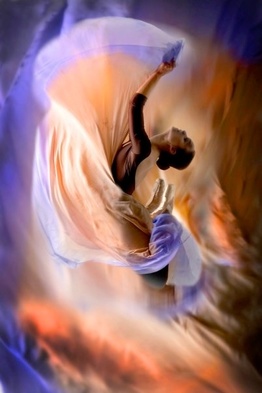
Dance from any era can be a beautiful expression, but the modern dance era ushered by Martha Graham has injected high energy and actively stretches to embrace the passions of human life. Dance features prominently in both scriptures, and there are lessons for us.
If we start in Mark 6, the dancer is Herod's daughter Salome (misnamed perhaps as Herodias) combined with a likely tipsy royal. Herod overextends himself with a wild promise to the girl. Her stunning petition - John the Baptist's head on a platter - reveals how the mighty one has been compromised and manipulated by his own words. Having to save face before an array of VIP guests at his birthday party, he is trapped and orders the execution. It is a lesson in how the worldly powers and powerful people are often very willing to sacrifice righteousness for sin, life for death.
In 2 Samuel 6, David has decided to resume the journey which would bring the Ark of the Covenant into Jerusalem. It had been aborted when the initial gala was organized to celebrate David, his victories, his status, his position, and his achievements. God was left out. Poor Uzzah, who tried to save the Ark of God (save God) when it seemed imperiled on the cart, was struck dead. Uzzah's action reflected the unfaithfulness and hubris of the whole event - the last straw, it seems, for God.
In this passage, David comes to the occasion quite differently. The procession has hardly begun moving before the king makes sacrifices and humbles himself before God. Now it's clear that it was God who gave David all of his triumphs, and this celebration is not a congratulatory parade for David, but a joyous thanksgiving procession celebrating the love and devotion of God for his people.
David dances in un-kingly style, wearing only a linen ephod, not the royal regalia of either victorious general or triumphant king. He is openly loathed and chastized by the late King Saul's daughter, Michal. But David doesn't care, declaring his devotion to God would cause him to go even further.
The worldly hubris of the first attempt brought death, but in this second attempt, the blessing of becomes the primary focus, and God's blessing has converted David into a witness for the Kingdom of God where the last are first and the first are last.
Sorry about no video. The camera cut off because it ran out of memory, and then I mistakenly lost the fragment that did come through. (Too bad, I showed my dancing skills so aptly, and did a decent drunken Herod impersonation.) Alas, there is the text downloadable below as well as the Fairfielder answers.
If we start in Mark 6, the dancer is Herod's daughter Salome (misnamed perhaps as Herodias) combined with a likely tipsy royal. Herod overextends himself with a wild promise to the girl. Her stunning petition - John the Baptist's head on a platter - reveals how the mighty one has been compromised and manipulated by his own words. Having to save face before an array of VIP guests at his birthday party, he is trapped and orders the execution. It is a lesson in how the worldly powers and powerful people are often very willing to sacrifice righteousness for sin, life for death.
In 2 Samuel 6, David has decided to resume the journey which would bring the Ark of the Covenant into Jerusalem. It had been aborted when the initial gala was organized to celebrate David, his victories, his status, his position, and his achievements. God was left out. Poor Uzzah, who tried to save the Ark of God (save God) when it seemed imperiled on the cart, was struck dead. Uzzah's action reflected the unfaithfulness and hubris of the whole event - the last straw, it seems, for God.
In this passage, David comes to the occasion quite differently. The procession has hardly begun moving before the king makes sacrifices and humbles himself before God. Now it's clear that it was God who gave David all of his triumphs, and this celebration is not a congratulatory parade for David, but a joyous thanksgiving procession celebrating the love and devotion of God for his people.
David dances in un-kingly style, wearing only a linen ephod, not the royal regalia of either victorious general or triumphant king. He is openly loathed and chastized by the late King Saul's daughter, Michal. But David doesn't care, declaring his devotion to God would cause him to go even further.
The worldly hubris of the first attempt brought death, but in this second attempt, the blessing of becomes the primary focus, and God's blessing has converted David into a witness for the Kingdom of God where the last are first and the first are last.
Sorry about no video. The camera cut off because it ran out of memory, and then I mistakenly lost the fragment that did come through. (Too bad, I showed my dancing skills so aptly, and did a decent drunken Herod impersonation.) Alas, there is the text downloadable below as well as the Fairfielder answers.
| 07-12-15-ff-answers.pdf |
| 07-12-15-dance_lessons.pdf |
